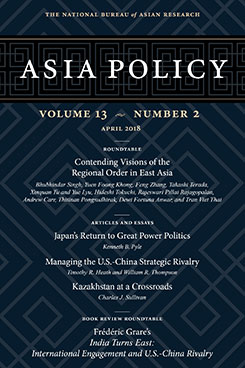Essay in Asia Policy (April 2018)
Kazakhstan at a Crossroads
This essay examines Kazakhstan’s latest economic modernization campaign, highlights its shortcomings, and proposes how the West could assist the country’s ruling elite in carrying out reforms to complement the modernization process.
EXECUTIVE SUMMARY
MAIN ARGUMENT
Kazakhstan seeks to undergo economic modernization, but its proposed reforms face a number of obstacles. Although Kazakhstan is the most developed and stable country in Central Asia, it remains to be seen whether the ruling elite will usher in an era of sustained economic development complemented by political reforms. The country stands to lose much if this effort fails. Over the course of the past generation, Kazakhstan has never made political liberalization a priority. Yet political reforms are seemingly necessary to realize its stated goals of establishing the rule of law, a service-oriented economy, and a professionalized bureaucracy. Kazakhstan stands at a crossroads due to a worsening of great-power relations and a seeming reluctance among the local ruling elite to embrace reformist measures.
POLICY IMPLICATIONS
- Kazakhstan aspires to transform its economy into a powerhouse by adhering to a detailed strategy over the course of the next generation. However, the success of the country’s economic modernization campaign will in large part depend on the extent to which political liberalization, especially the dispersion of elite controls over the political system and the institutionalization of power, is embraced by the government.
- Given that Kazakhstan lacks a democratic history, has yet to experience a peaceful transfer of power, and cannot afford to upset relations with Russia and China, Astana will need to tread carefully should it decide to pursue an agenda of political liberalization.
- Western states, acting in an advisory capacity, could assist Kazakhstan with carrying out reforms designed to disperse and institutionalize political power by arguing on behalf of blending certain political development models.
- Despite Western actions, however, the fate of Kazakhstan’s reformist drive is largely predicated on whether local powerbrokers believe in the need for meaningful political reform.
About Asia Policy
Asia Policy is a peer-reviewed scholarly journal presenting policy-relevant academic research on the Asia-Pacific that draws clear and concise conclusions useful to today’s policymakers. Asia Policy is published quarterly in January, April, July, and October and accepts submissions on a rolling basis. Learn more


